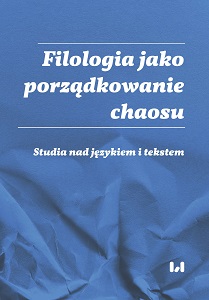O strukturach z czasownikami cogitandi i sentiendi oraz ich funkcjach w powieści Bez dogmatu Henryka Sienkiewicza
Predicates with cogitandi and sentiendi verbs and their functions in (the novel) Bez dogmatu by Henryk Sienkiewicz
Author(s): Agnieszka Zatorska
Subject(s): Language studies, Theoretical Linguistics, Philology
Published by: Wydawnictwo Uniwersytetu Łódzkiego
Keywords: mental verbs; verbs of emotion; literary text; syntax
Summary/Abstract: The paper focuses on the set of mental and emotional units (cogitandi and sentiendi verbs) which were taken from the novel entitled Bez dogmatu written by Henryk Sienkiewicz. The analysis encompasses 500 occurrences of 118 verbs — 46 cogitandi and 72 sentiendi ones. The theme of the novel, which is a love drama, and the narration in the form of a diary allow the supposition of a wide range of analysed predicates. Cogitandi verbs are more frequent in the studied text, but the scope of sentiendi verbs is much wider and more diverse. The number of single emotional units is higher than mental ones. The conducted analysis confirms the adopted hypothesis regarding the frequency of occurrence of the said verbs. The linguistic investigation shows the way in which the writer, through his decisions about the stylistic form, presents the internal world (emotions, memories, thoughts) of the main hero and other characters.
- Page Range: 285-297
- Page Count: 13
- Publication Year: 2018
- Language: Polish
- Content File-PDF

